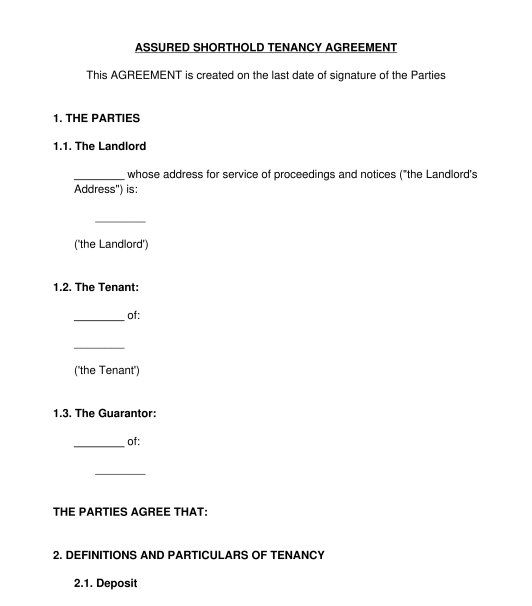 13/11/2025
13/11/2025

Answer a few questions and your document is created automatically.

Your document is ready! You will receive it in Word and PDF formats. You will be able to modify it.




Rating: 4.5 - 84 votes
Fill out the templateAn assured shorthold tenancy agreement (AST) is the most common form of private residential tenancy agreement in England*. It is a type of tenancy agreement.
An AST agreement will be used by a landlord when they are letting out a property. The AST agreement will grant the tenant the right to occupy and live in the property. It will set out the rights and obligations of the tenant and the landlord.
This AST agreement can be used to create a tenancy for a fixed period.
Different residential tenancy agreements should be used in Northern Ireland and in Scotland.
It is possible to have a tenancy agreement that is a:
This agreement may be used to create a fixed-term tenancy, which may then convert into a statutory periodic tenancy.
Many tenancy agreements start with a fixed term (e.g. 12 months or 6 months). At the end of that term, the agreement may then convert into a periodic tenancy (a rolling tenancy)
A tenant will have particular rights under a tenancy agreement. In particular, a certain legal process must be followed to terminate the tenancy. A tenant will enjoy the exclusive occupation of the relevant space.
Under a lodger agreement, the lodger will only have the right to use a certain space or room and this will be in common with the owner. This means the owner (landlord) will retain the right to enter the room or space occupied by the lodger in all circumstances. Typically, a lodger can be asked to leave by the property owner providing written notice at any time.
This tenancy agreement is a residential tenancy agreement. It will be used where the tenant will live in the property. The property will be their main home.
A business lease agreement will be used where the property will be used for business purposes only. Commercial tenants have different rights and responsibilities, including obligations regarding the maintenance of the property.
No. A landlord can rent a property without a formal written agreement. However, it is always best to set out an agreement in writing so that the tenant and the landlord have a clear understanding of the agreement. In particular, the agreement will help the tenant to understand the terms of occupation.
Security of tenure refers to the tenant's right to remain in the property. A landlord will need to follow a strict process to formally evict a tenant. The grounds that can be relied upon for eviction will depend upon the nature of the tenancy and whether it is a fixed term or periodic tenancy.
A guarantor will agree to pay the rent if the tenant cannot or does not pay this. The guarantor can be in an individual or a corporate entity (a company). This tenancy agreement may include a guarantor as a party if desired.
Before a landlord enters into a tenancy agreement, they should:
A landlord may also request to undertake additional checks in relation to tenants, such as:
If a deposit is payable, the parties will need to make arrangements for this to be paid by the tenant at the outset of the agreement.
The landlord must have the authority to let the property, so they must either own the property or have a legal right or interest in the property. The landlord should ensure that they have the relevant permission to let the property, which will include permission from a mortgage lender. The tenant should be over the age of 18 and must have the right to rent a property in the United Kingdom.
The parties can agree upon a fixed term. Commonly, this will be a period of 6 or 12 months. After the fixed term, the tenancy agreement can be converted into a periodic tenancy.
This tenancy agreement is designed for use where the fixed term will not exceed 3 years. If the parties wish to create a tenancy agreement for a term exceeding 3 years, then there will be additional requirements. If the parties would like to get advice about a tenancy agreement for a term exceeding 3 years, they should seek specialist advice from a regulated lawyer.
The parties should sign and date the agreement once it has been finalised. After the document has been signed by both parties, each party should retain a signed copy. The tenant may then occupy the property under the terms of the agreement.
The agreement must include an inventory and schedule of condition should be completed and attached to the agreement before signing.
A property inventory and schedule of condition will provide a summary of all the items (such as furniture and white goods) in the property and will note the condition of those items.
A tenancy agreement should include information about:
A tenant can generally end an assured tenancy agreement:
A landlord can generally end an assured tenancy agreement:
A landlord should seek advice/obtain information about the termination process, required notice periods and the relevant legal grounds before ending a tenancy.
The following legal provisions are most relevant to a tenancy agreement:
A property owner should also consider safety/legal requirements relating to:
The government website has more information about the legal obligations of landlords.
You fill out a form. The document is created before your eyes as you respond to the questions.
At the end, you receive it in Word and PDF formats. You can modify it and reuse it.
Guides to help you
Assured Shorthold Tenancy Agreement - Sample, template
Country: United Kingdom